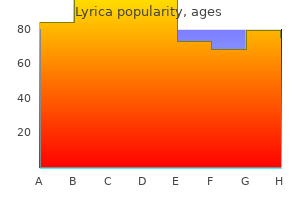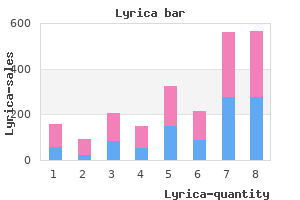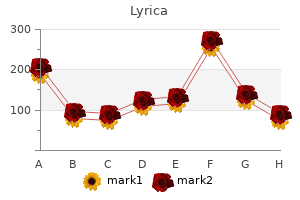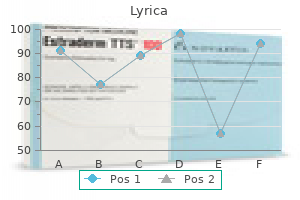"Buy lyrica 150 mg visa, mental treatment quotes".
By: L. Hengley, M.B.A., M.B.B.S., M.H.S.
Vice Chair, Mayo Clinic College of Medicine
In 2011 disorders of brain quest order lyrica 150 mg otc, four executives of the medical device company Synthes were sentenced to less than a year in prison for conducting clinical trials that were not authorized by the Food and Drug Administration mental therapy edmonton buy lyrica 150mg online. Pharmaceutical was sentenced to 30 days in jail and fined $1 million for selling misbranded morphine tablets. The previous year, the Department of Health and Human Services excluded him from doing business with the federal government. Those in the pharmaceutical industry have stressed that the activities revealed in the recent settlements occurred many years ago, and practices have changed radically since then. The Glaxo settlement includes an agreement by the company to withdraw bonuses from top executives if they engaged in or supervised illegal behavior, believed to be a first. A version of this article appears in print on July 3, 2012, on Page A1 of the New York edition with the headline: Drug Firm Guilty In Criminal Case. Children (12 months to 12 years of age) the first dose is administered at 12 to 15 months of age but may be given anytime through 12 years of age. The sterile diluent does not contain preservatives or other anti-viral substances which might inactivate the vaccine virus. To reconstitute the vaccine, withdraw the total volume of supplied sterile diluent and inject into the lyophilized vaccine vial. Visually inspect the vaccine before and after reconstitution prior to administration. Before reconstitution, the lyophilized vaccine is a white compact crystalline plug. Withdraw the entire amount of reconstituted vaccine, inject the total volume and discard vial. Disseminated varicella disease and extensive vaccine-associated rash have been reported in individuals who are immunosuppressed or immunodeficient who were inadvertently vaccinated with a varicella-containing vaccine. Wild-type varicella is known to cause fetal harm [see Use in Specific Populations (8. Susceptible high-risk individuals include: · Immunocompromised individuals; · Pregnant women without documented history of varicella or laboratory evidence of prior infection; · Newborn infants of mothers without documented history of varicella or laboratory evidence of prior infection and all newborn infants born at <28 weeks gestation regardless of maternal varicella immunity. These products may contain antibodies that interfere with vaccine virus replication and decrease the expected immune response. Vaccine-related adverse reactions reported during clinical trials were assessed by the study investigators to be possibly, probably, or definitely vaccine-related and are summarized below. In a double-blind, placebo-controlled study among 914 healthy children and adolescents who were serologically confirmed to be susceptible to varicella, the only adverse reactions that occurred at a significantly (p<0. The 2-dose regimen of varicella vaccine had a safety profile comparable to that of the 1-dose regimen. The overall incidence of injection-site clinical complaints (primarily erythema and swelling) observed in the first 4 days following vaccination was 25. Because the events are reported voluntarily from a population of uncertain size, it is not always possible to reliably estimate their frequency or establish a causal relationship to vaccine exposure. Body as a Whole Anaphylaxis (including anaphylactic shock) and related phenomena such as angioneurotic edema, facial edema, and peripheral edema. Reported cases were commonly associated with preceding or concurrent herpes zoster rash [see Clinical Pharmacology (12. Skin Stevens-Johnson syndrome; erythema multiforme; Henoch-Schцnlein purpura; secondary bacterial infections of skin and soft tissue, including impetigo and cellulitis; herpes zoster. In children through the age of 12 years at least 3 months should elapse between administration of 2 doses of a live attenuated varicella virus-containing vaccine. No increased risk for miscarriage, major birth defect or congenital varicella syndrome was observed in a pregnancy exposure registry that monitored outcomes after inadvertent use. After excluding elective terminations (n=60), ectopic pregnancies (n=1) and those lost to follow-up (n=556), there were 905 pregnancies with known outcomes. Of these 905 pregnancies, 271 (30%) were in women who were vaccinated within the three months prior to conception. Miscarriage was reported for 10% of pregnancies (95/905), and major birth defects were reported for 2.

The flight surgeon is referred to standard medical texts for complete discussions of these dysfunctions mental conditions characterized excessive irrational order cheapest lyrica. Either state is a grounding defect and warrants follow-up within the hospital system mental illness groups buy lyrica 150mg with amex. Thyroid Disorders Hyperthyroidism Simply defined, hyperthyroidism is excessive production of thyroid hormones resulting in a hypermetabolic state with associated adrenergic-like symptoms. Hyperthyroidism may be subdivided into relatively common and relatively rare forms. Relatively rare forms include choriocarcinoma, metastatic testicular bryonal cell carcinoma, and struma. Iodine (for emergency treatment of thyroid storm or in preoperative patients) to reduce thyroid vascularity. It is of importance to point out that hyperthyroidism is disqualifying in the aviator unless definitive treatment (either 1131 or surgical thyroidectomy) has been undertaken. In either of these instances, the potential for subsequent hypothyroidism is present. Hypothyroidism Hypothyroidism is a state of thyroid insufficiency in which a hypometabolic condition opposite that of hyperthyroidism ensues. The most common form of hypothyroidism is that of primary hypothyroidism in which the thyroid gland itself cannot synthesize sufficient thyroid hormone for metabolic needs. Radioactive 1131 therapy results in 25 percent of patients being hypothyroid at the end of one year and 50 percent of patients being hypothyroid at the end of 10 years. Other causes of hypothyroidism are uncommon, but virtually all require thyroid replacement. If replacement therapy results in a euthyroid state, the aviator may be considered for a return to flight status, as long as follow-up thyroid studies and replacement therapy can be made available. Disorders of the Glucose Metabolism Diabetes Mellitus Diabetes mellitus is a functional disturbance of pancreatic islet cells resulting in metabolic abnormalities in the handling of not only sugars, but proteins and fats as well. It constitutes the fifth leading cause of death in the United States behind coronary artery disease, cancer, accidents, and 5-53 U. Over 50 percent of diabetics die because of coronary artery disease; diabetes is also the leading cause of adult blindness. Diabetes has been recognized to result from two distinct clinical entities: insulindependent (juvenile-onset), and noninsulin-dependent (adult-onset) diabetes. The patient must be on a carbohydrate-loading diet (300 gm/day) for a minimum of three days. The physician must, himself, be acquainted with the laboratory techniques since plasma values are 15 to 20 percent higher than whole blood values. Fajans-Conn criteria require that all three values (1, 1 1/2, and 2 hours) be exceeded for the diagnosis. To improperly label a patient as diabetic is as grave an injustice to him as is missing the diagnosis in a patient who is clearly diabetic on clinical and laboratory grounds. For these subclinical or latent diabetics ("glucose intolerance" being a better choice of terms in most instances), weight control and dietary programs are likely indicated. Oral hypoglycemics should not be considered as a means of keeping the pilot "up" since undesired side effects. Hypoglycemia Hypoglycemia indicates excessively rapid removal of glucose from the blood or an inability of gluconeogenesis to sustain adequate glucose levels. When blood sugar falls at a precipitous rate, the patient displays signs of hyperepinephrinemia. A slower fall in glucose (which may result in a lower blood sugar than the former state) may give rise to cerebral symptoms. Hypoglycemia, which is not a specific disease state in and of itself, is classified as being either functional or organic. Examples include beta-cell tumor of the pancreas, adrenocortical hypofunction, anterior pituitary hypofunction, epithelioid tumors derived from neural crest. Alimentary hypoglycemia in postoperative gastrectomy or gastrojejunostomy patients.

Written consent of a parent or legal guardian must be obtained prior to the enlistment of a minor into any component of the Navy mental disorders genetic predisposition order cheap lyrica on-line. If a minor is at least 17 years old mental disorders that cause delusions buy online lyrica, had enlisted without proper consent, and the parent or legal guardian requests discharge within 90 days of enlistment, separation shall be authorized unless the member will no longer be a minor by the time of discharge. The enlistment of a minor with false representation as to age or without proper consent will not, in and of itself, be considered a fraudulent enlistment. When the minor is at least 17 years old, the commanding officer is required to make a statement concerning whether, in his or her opinion, the member is sufficiently mature for retention; a negative opinion in this respect is to be accompanied by an evaluation by a qualified psychiatrist (when a psychiatrist is not reasonably available, evaluation by a medical office is to be submitted). A member in a limited duty status who is not considered to be an asset to the service (because of one or more reasons for administrative separation) may be separated when maximum benefit of inpatient hospitalization and treatment have been achieved and when retention is considered not to be in the b e s t i n t e r e s t o f the s e r v i c. As an exception to this, a Medical Board shall be submitted whenever a question of mental competence arises. When the command recommends retention, and either the defect is no longer present or the defect is waiverable and a waiver has been obtained from the Commander, Naval Military Personnel Command, processing for separation is not necessary. Prior to processing, the member must have been counseled in writing, with specific recommendations for corrective action and a comprehensive explanation of the consequences of failure to undertake the recommended corrective action, and there must be a reasonable opportunity for the member to respond to this counseling. Nothing precludes processing a member in entry level status for separation under the provisions of other Articles, if appropriate. There is an injunction against processing for separation by this reason when the member is in entry level status or when processing by reason of misconduct is appropriate. Among the concerns cited to support the policy of not enlisting or retaining homosexuals or bisexuals are: impairment of mission accomplishment; degradation of discipline, good order, and morale; inability to foster trust and confidence among members and to ensure integrity of the system of rank and command; disruption to assignment policies and world-wide deployment of members who often must live and work under close conditions affording minimal privacy; and negative impact on recruiting, retention, and acceptability of the Navy by the public. Also listed as a reason for barring homosexuals is to prevent breaches of security; this would seem to be a valid consideration only because homosexuality is forbidden and therefore homosexuals could be vulnerable to security compromise. A "homosexual" is defined as a person, regardless of sex, who engages in, desires to engage in, or intends to engage in homosexual acts (bodily contact, actively undertaken or passively permitted, between members of the same sex for the purpose of satisfying sexual desires); a "bisexual" is a person who engages in, desires to engage in, or intends to engage in both homosexual and heterosexual acts. Under any of the aggravating circumstances listed directly above, a separation characterized as under Other Than Honorable Conditions would be appropriate; also, if conditions warrant, referral of the case to trial by court-martial is authorized. This Article anticipates the occasions when multiple processing will be appropriate. Commission of a serious military or civilian offense if the specific circumstances of the offense warrant separation and if the Manual for Courts Martial would authorize a punitive discharge for the same or a closely related offense. A reservist on active duty within two years of retirement eligibility may not be separated involuntarily unless this action is approved by the Secretary of the Navy. Characterization of service for separations effected under this Article will normally be under Other Than Honorable Conditions. Characterization as General may be assigned when appropriate, but Honorable will not be authorized unless the Commander, Naval Military Personnel Command or higher authority concurs that the record is otherwise so meritorious that any lesser characterization would be inappropriate. A reservist on active duty within two years of retirement eligibility may not be released involuntarily unless this is approved by the Secretary of the Navy. Normally, characterization of separation will be under Other Than Honorable Conditions except when the type warranted by the Service Record (Honorable or General) or Entry Level Separation is required by processing based solely on urinalysis testing (fitness for duty) results. Members should understand that a formally submitted request may not be withdrawn unless the officer exercising General Court Martial jurisdiction in the case concurs, and that any approved separation by this reason will be a bar to reentering any military service. Flight surgeons will be involved in such cases at least to the extent of providing, for inclusion in the package submitted to higher authority, a report of medical examinations and either a written statement that a psychiatric evaluation is not warranted or a copy of a psychiatric evaluation. Referral to a psychiatrist may be made only after evaluation by a nonpsychiatrist medical officer and is, in general, only appropriate when there is a question of competence: could the accused member adhere to the law at the time of the alleged offense. Characterization as General may be approved by the Commander, Naval Military Personnel Command and, in some circumstances, an Entry Level Separation may be authorized. This shall not be used as the reason for separation if processing under any other Article would be appropriate. The purpose of this section is to assist in determining whether or not there is a problem, and if so, what to do. Identification of Problem Cases Whether the evaluation is as casual as a conversation with a pilot in the passageway, or as formal as a Special Board of Flight Surgeons, every evaluation performed by a flight surgeon seeks to answer two questions: (1) is the individual safe to perform his aviation duties, and (2) is the individual likely to remain so in the future? Disagreement might be expected, however, about the fate of a lieutenant commander with 14 years of service and several fleet tours who suffers the same problem. The aviation experience of the lieutenant commander might allow him to compensate for the defect.


Accreditation of such courses is handled much as it is in accounting mental illness case studies order 150 mg lyrica, architecture mental illness journal order cheap lyrica line, and law. For all the small differences among these three codes, there is a fundamental agreement about how to deal with conflict of interest. First, the requirement of avoidance applies not only to "real" conflicts of interest but also to "perceived" ones. Perception-that is, the appearance-of a conflict of interest is treated as being just as bad as the reality. Even perceived conflicts should therefore be avoided (whatever the underlying reality about the interests in question). The underlying reality does not matter to those who would like to rely on an engineer-until it is disclosed and the false appearance is dispelled. The other engineering codes do provide guidance concerning this question, although the particulars vary a good deal, depending on the circumstances in question. The fundamental canons (about 3 percent of the code) contains three sentences relevant to conflict of interest (in language dating from one of the first engineering codes): "Engineers, in the fulfillment of their professional duties, shall. The specific rules under a rule (designated with lowercase letters) are applications or elaborations of the prefacing rule. In addition, Professional Obligations (about 40 percent of the code) contains six more rules related to conflict of interest. A detailed review of the provisions shows that they cover a surprisingly large number of specific issues. Although the language is vague, it is obviously meant to sweep wide (something that we might not expect in a code designed for discipline rather than for personal guidance). Engineers are-as Fundamental Canon 1 puts it-to "[h]old paramount the safety, health, and welfare of the public. The most popular view, though, seems to be that the public includes all those who, owing to a lack of knowledge, power, or opportunity, are unable to protect themselves fully from what engineers do. Insofar as what engineers say in public may be influenced by an interested party other than the public, the public needs to know about that influence if it is to decide the appropriate weight to give the statement. The engineer, of course, tries to speak "in an objective and truthful manner" (as Canon 3 requires). If the engineer is not trying to do that, he or she should not speak at all (or, at least, not claim to speak as an engineer). However, if an engineer is aware of an influence that might (but also might not) undermine his or her ability to speak in an objective and truthful manner, he or she must warn the public of that danger to objectivity. There is nothing wrong with issuing public statements in the service of a client or an employer (as long as the statements are objective and truthful). There is, however, something wrong with an engineer giving the impression that he or she is doing something else, that is, expressing independent professional judgment (one independent of an employer, client, or other interested party) when it is not. An engineer must not give a false impression if he or she can reasonably avoid it. Experience and common sense suggest that an engineer may easily avoid giving that false impression by explicitly stating what he or she is doing as he or she begins the public statement in question. The rule seems to be concerned with those conflicts that cannot be (or that perhaps just have not been) avoided. The client or employer may be a private firm, but the engineer should recuse himself or herself even if the client or the employer with an interest in the decision is another governmental (or quasigovernmental) agency. Disclosure of a conflict of interest to the relevant agency does not, as such, protect the public. The disclosure would have to be made to the public directly in a way that allows the public to take appropriate action. This can seldom happen when the engineer is advising a public agency (as it can when an engineer is speaking to the public directly). Disclosure to the relevant agency does not necessarily reach the public, and even when it does, the agency and not the public would ordinarily make the decision. Indeed, it seems to be designed to protect the principal or the officer in question from the appearance of conflict as well as from actual conflict.
Lyrica 75 mg sale. Parenting Children With Mental Illness: Seasonal Affective Disorder.

